Contract Law: Terms, Representations, and Exclusion Clauses
VerifiedAdded on 2020/03/28
|6
|2056
|77
Case Study
AI Summary
This case study delves into contract law, analyzing various aspects of a contract between Peter and Forever Furniture. The assignment examines the significance of contractual terms, differentiating between express and implied terms, conditions, and warranties. It also explores representations made during the contract formation, distinguishing between actionable representations and mere sales puffs, and their implications for remedies. The case study further investigates the role and validity of exclusion clauses, considering their incorporation and legality under consumer legislation. References to relevant legal precedents such as Hong Kong Fir Shipping v Kawasaki Kisen Kaisha, Bettini v Gye, and Poussard v Spiers are included to support the legal arguments and analysis. The case assesses the remedies available to parties when there is a breach of contract and also explores the implication of false pre-contractual statements.
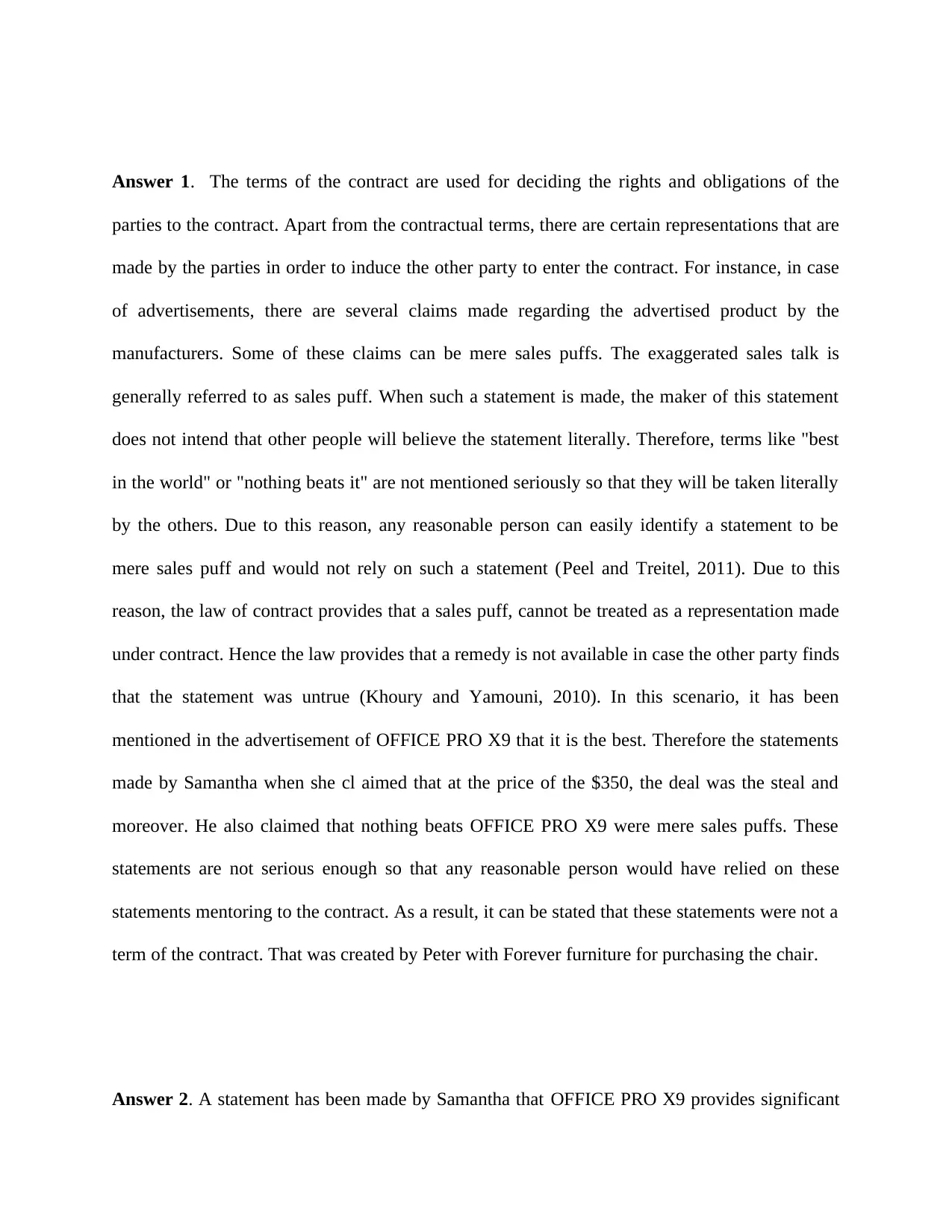
Answer 1. The terms of the contract are used for deciding the rights and obligations of the
parties to the contract. Apart from the contractual terms, there are certain representations that are
made by the parties in order to induce the other party to enter the contract. For instance, in case
of advertisements, there are several claims made regarding the advertised product by the
manufacturers. Some of these claims can be mere sales puffs. The exaggerated sales talk is
generally referred to as sales puff. When such a statement is made, the maker of this statement
does not intend that other people will believe the statement literally. Therefore, terms like "best
in the world" or "nothing beats it" are not mentioned seriously so that they will be taken literally
by the others. Due to this reason, any reasonable person can easily identify a statement to be
mere sales puff and would not rely on such a statement (Peel and Treitel, 2011). Due to this
reason, the law of contract provides that a sales puff, cannot be treated as a representation made
under contract. Hence the law provides that a remedy is not available in case the other party finds
that the statement was untrue (Khoury and Yamouni, 2010). In this scenario, it has been
mentioned in the advertisement of OFFICE PRO X9 that it is the best. Therefore the statements
made by Samantha when she cl aimed that at the price of the $350, the deal was the steal and
moreover. He also claimed that nothing beats OFFICE PRO X9 were mere sales puffs. These
statements are not serious enough so that any reasonable person would have relied on these
statements mentoring to the contract. As a result, it can be stated that these statements were not a
term of the contract. That was created by Peter with Forever furniture for purchasing the chair.
Answer 2. A statement has been made by Samantha that OFFICE PRO X9 provides significant
parties to the contract. Apart from the contractual terms, there are certain representations that are
made by the parties in order to induce the other party to enter the contract. For instance, in case
of advertisements, there are several claims made regarding the advertised product by the
manufacturers. Some of these claims can be mere sales puffs. The exaggerated sales talk is
generally referred to as sales puff. When such a statement is made, the maker of this statement
does not intend that other people will believe the statement literally. Therefore, terms like "best
in the world" or "nothing beats it" are not mentioned seriously so that they will be taken literally
by the others. Due to this reason, any reasonable person can easily identify a statement to be
mere sales puff and would not rely on such a statement (Peel and Treitel, 2011). Due to this
reason, the law of contract provides that a sales puff, cannot be treated as a representation made
under contract. Hence the law provides that a remedy is not available in case the other party finds
that the statement was untrue (Khoury and Yamouni, 2010). In this scenario, it has been
mentioned in the advertisement of OFFICE PRO X9 that it is the best. Therefore the statements
made by Samantha when she cl aimed that at the price of the $350, the deal was the steal and
moreover. He also claimed that nothing beats OFFICE PRO X9 were mere sales puffs. These
statements are not serious enough so that any reasonable person would have relied on these
statements mentoring to the contract. As a result, it can be stated that these statements were not a
term of the contract. That was created by Peter with Forever furniture for purchasing the chair.
Answer 2. A statement has been made by Samantha that OFFICE PRO X9 provides significant
Paraphrase This Document
Need a fresh take? Get an instant paraphrase of this document with our AI Paraphraser
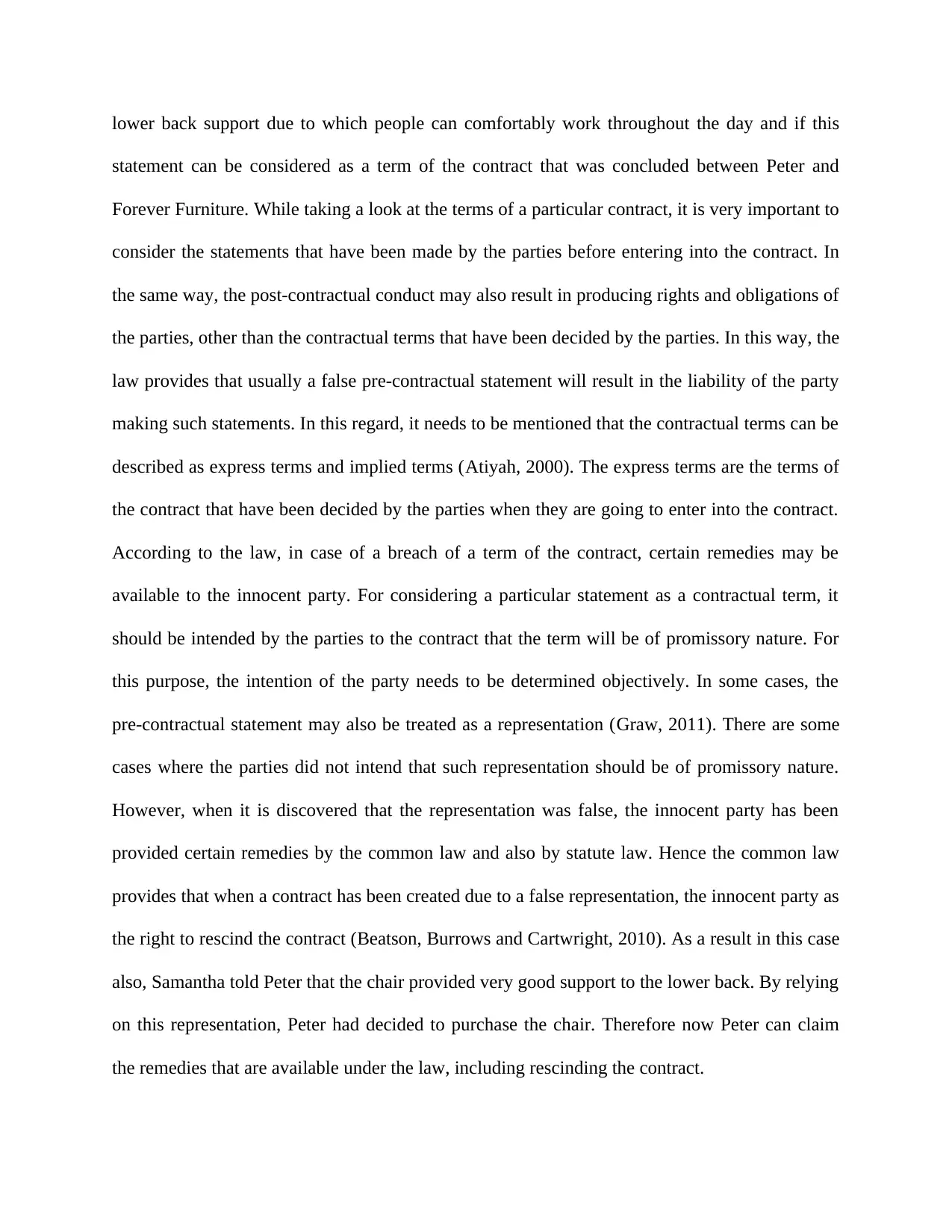
lower back support due to which people can comfortably work throughout the day and if this
statement can be considered as a term of the contract that was concluded between Peter and
Forever Furniture. While taking a look at the terms of a particular contract, it is very important to
consider the statements that have been made by the parties before entering into the contract. In
the same way, the post-contractual conduct may also result in producing rights and obligations of
the parties, other than the contractual terms that have been decided by the parties. In this way, the
law provides that usually a false pre-contractual statement will result in the liability of the party
making such statements. In this regard, it needs to be mentioned that the contractual terms can be
described as express terms and implied terms (Atiyah, 2000). The express terms are the terms of
the contract that have been decided by the parties when they are going to enter into the contract.
According to the law, in case of a breach of a term of the contract, certain remedies may be
available to the innocent party. For considering a particular statement as a contractual term, it
should be intended by the parties to the contract that the term will be of promissory nature. For
this purpose, the intention of the party needs to be determined objectively. In some cases, the
pre-contractual statement may also be treated as a representation (Graw, 2011). There are some
cases where the parties did not intend that such representation should be of promissory nature.
However, when it is discovered that the representation was false, the innocent party has been
provided certain remedies by the common law and also by statute law. Hence the common law
provides that when a contract has been created due to a false representation, the innocent party as
the right to rescind the contract (Beatson, Burrows and Cartwright, 2010). As a result in this case
also, Samantha told Peter that the chair provided very good support to the lower back. By relying
on this representation, Peter had decided to purchase the chair. Therefore now Peter can claim
the remedies that are available under the law, including rescinding the contract.
statement can be considered as a term of the contract that was concluded between Peter and
Forever Furniture. While taking a look at the terms of a particular contract, it is very important to
consider the statements that have been made by the parties before entering into the contract. In
the same way, the post-contractual conduct may also result in producing rights and obligations of
the parties, other than the contractual terms that have been decided by the parties. In this way, the
law provides that usually a false pre-contractual statement will result in the liability of the party
making such statements. In this regard, it needs to be mentioned that the contractual terms can be
described as express terms and implied terms (Atiyah, 2000). The express terms are the terms of
the contract that have been decided by the parties when they are going to enter into the contract.
According to the law, in case of a breach of a term of the contract, certain remedies may be
available to the innocent party. For considering a particular statement as a contractual term, it
should be intended by the parties to the contract that the term will be of promissory nature. For
this purpose, the intention of the party needs to be determined objectively. In some cases, the
pre-contractual statement may also be treated as a representation (Graw, 2011). There are some
cases where the parties did not intend that such representation should be of promissory nature.
However, when it is discovered that the representation was false, the innocent party has been
provided certain remedies by the common law and also by statute law. Hence the common law
provides that when a contract has been created due to a false representation, the innocent party as
the right to rescind the contract (Beatson, Burrows and Cartwright, 2010). As a result in this case
also, Samantha told Peter that the chair provided very good support to the lower back. By relying
on this representation, Peter had decided to purchase the chair. Therefore now Peter can claim
the remedies that are available under the law, including rescinding the contract.
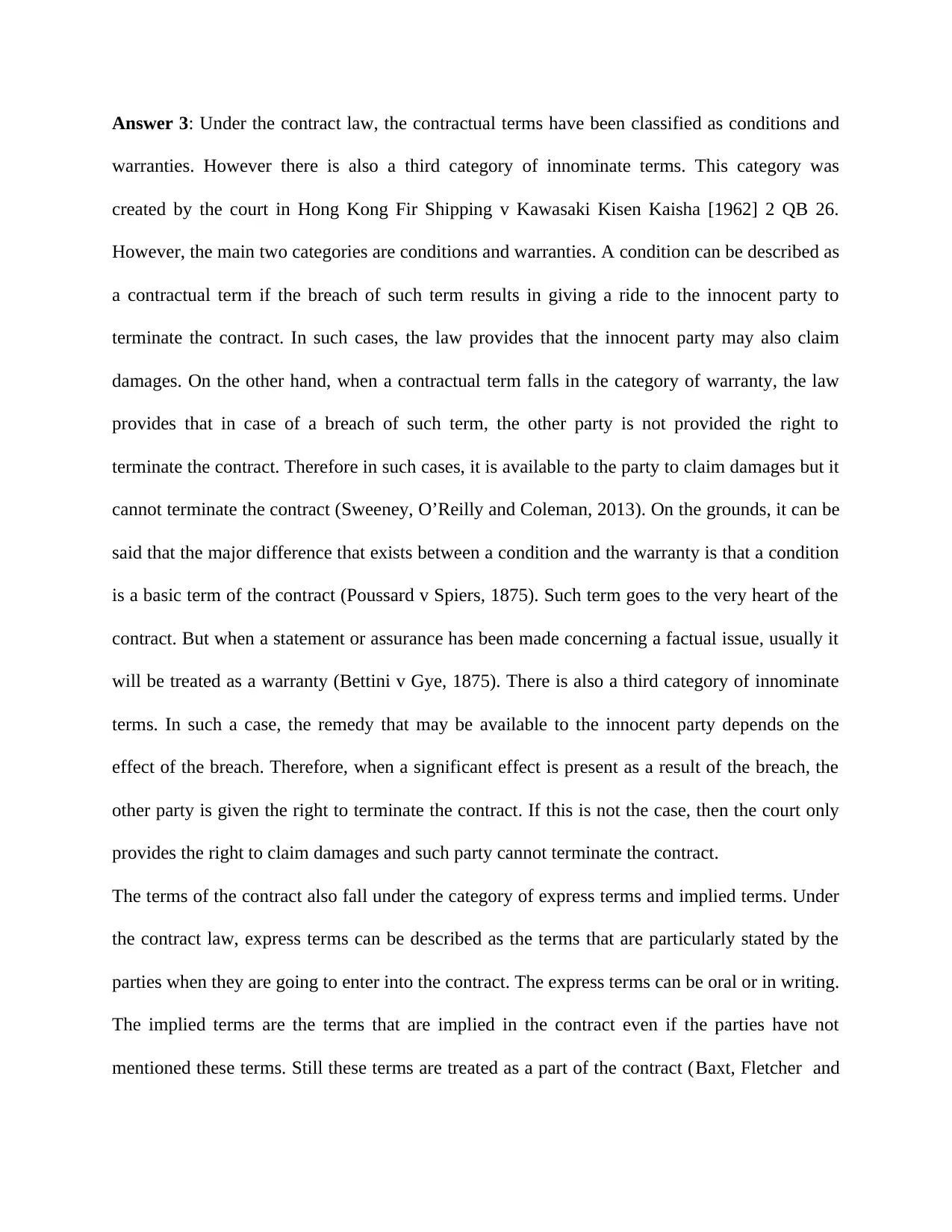
Answer 3: Under the contract law, the contractual terms have been classified as conditions and
warranties. However there is also a third category of innominate terms. This category was
created by the court in Hong Kong Fir Shipping v Kawasaki Kisen Kaisha [1962] 2 QB 26.
However, the main two categories are conditions and warranties. A condition can be described as
a contractual term if the breach of such term results in giving a ride to the innocent party to
terminate the contract. In such cases, the law provides that the innocent party may also claim
damages. On the other hand, when a contractual term falls in the category of warranty, the law
provides that in case of a breach of such term, the other party is not provided the right to
terminate the contract. Therefore in such cases, it is available to the party to claim damages but it
cannot terminate the contract (Sweeney, O’Reilly and Coleman, 2013). On the grounds, it can be
said that the major difference that exists between a condition and the warranty is that a condition
is a basic term of the contract (Poussard v Spiers, 1875). Such term goes to the very heart of the
contract. But when a statement or assurance has been made concerning a factual issue, usually it
will be treated as a warranty (Bettini v Gye, 1875). There is also a third category of innominate
terms. In such a case, the remedy that may be available to the innocent party depends on the
effect of the breach. Therefore, when a significant effect is present as a result of the breach, the
other party is given the right to terminate the contract. If this is not the case, then the court only
provides the right to claim damages and such party cannot terminate the contract.
The terms of the contract also fall under the category of express terms and implied terms. Under
the contract law, express terms can be described as the terms that are particularly stated by the
parties when they are going to enter into the contract. The express terms can be oral or in writing.
The implied terms are the terms that are implied in the contract even if the parties have not
mentioned these terms. Still these terms are treated as a part of the contract (Baxt, Fletcher and
warranties. However there is also a third category of innominate terms. This category was
created by the court in Hong Kong Fir Shipping v Kawasaki Kisen Kaisha [1962] 2 QB 26.
However, the main two categories are conditions and warranties. A condition can be described as
a contractual term if the breach of such term results in giving a ride to the innocent party to
terminate the contract. In such cases, the law provides that the innocent party may also claim
damages. On the other hand, when a contractual term falls in the category of warranty, the law
provides that in case of a breach of such term, the other party is not provided the right to
terminate the contract. Therefore in such cases, it is available to the party to claim damages but it
cannot terminate the contract (Sweeney, O’Reilly and Coleman, 2013). On the grounds, it can be
said that the major difference that exists between a condition and the warranty is that a condition
is a basic term of the contract (Poussard v Spiers, 1875). Such term goes to the very heart of the
contract. But when a statement or assurance has been made concerning a factual issue, usually it
will be treated as a warranty (Bettini v Gye, 1875). There is also a third category of innominate
terms. In such a case, the remedy that may be available to the innocent party depends on the
effect of the breach. Therefore, when a significant effect is present as a result of the breach, the
other party is given the right to terminate the contract. If this is not the case, then the court only
provides the right to claim damages and such party cannot terminate the contract.
The terms of the contract also fall under the category of express terms and implied terms. Under
the contract law, express terms can be described as the terms that are particularly stated by the
parties when they are going to enter into the contract. The express terms can be oral or in writing.
The implied terms are the terms that are implied in the contract even if the parties have not
mentioned these terms. Still these terms are treated as a part of the contract (Baxt, Fletcher and
⊘ This is a preview!⊘
Do you want full access?
Subscribe today to unlock all pages.

Trusted by 1+ million students worldwide
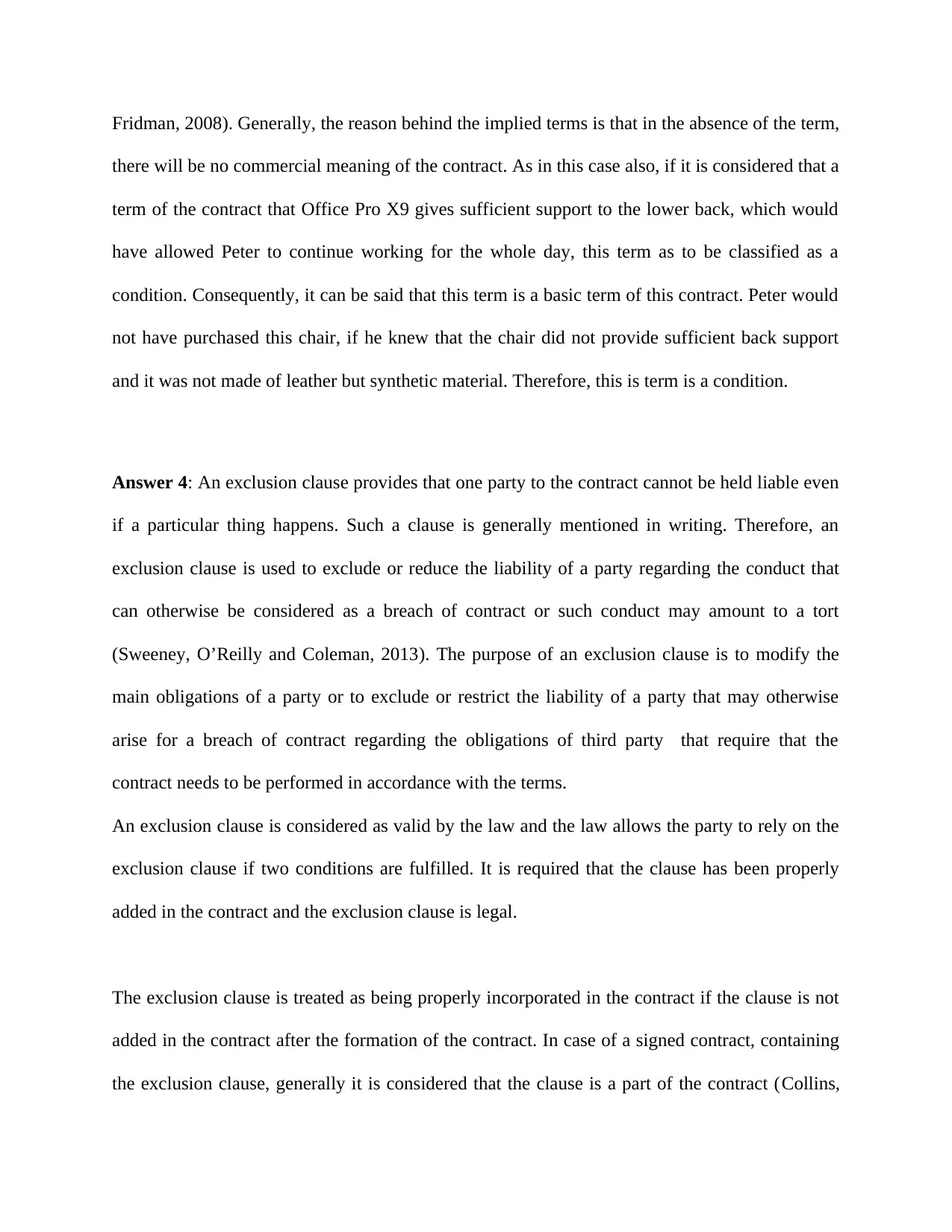
Fridman, 2008). Generally, the reason behind the implied terms is that in the absence of the term,
there will be no commercial meaning of the contract. As in this case also, if it is considered that a
term of the contract that Office Pro X9 gives sufficient support to the lower back, which would
have allowed Peter to continue working for the whole day, this term as to be classified as a
condition. Consequently, it can be said that this term is a basic term of this contract. Peter would
not have purchased this chair, if he knew that the chair did not provide sufficient back support
and it was not made of leather but synthetic material. Therefore, this is term is a condition.
Answer 4: An exclusion clause provides that one party to the contract cannot be held liable even
if a particular thing happens. Such a clause is generally mentioned in writing. Therefore, an
exclusion clause is used to exclude or reduce the liability of a party regarding the conduct that
can otherwise be considered as a breach of contract or such conduct may amount to a tort
(Sweeney, O’Reilly and Coleman, 2013). The purpose of an exclusion clause is to modify the
main obligations of a party or to exclude or restrict the liability of a party that may otherwise
arise for a breach of contract regarding the obligations of third party that require that the
contract needs to be performed in accordance with the terms.
An exclusion clause is considered as valid by the law and the law allows the party to rely on the
exclusion clause if two conditions are fulfilled. It is required that the clause has been properly
added in the contract and the exclusion clause is legal.
The exclusion clause is treated as being properly incorporated in the contract if the clause is not
added in the contract after the formation of the contract. In case of a signed contract, containing
the exclusion clause, generally it is considered that the clause is a part of the contract (Collins,
there will be no commercial meaning of the contract. As in this case also, if it is considered that a
term of the contract that Office Pro X9 gives sufficient support to the lower back, which would
have allowed Peter to continue working for the whole day, this term as to be classified as a
condition. Consequently, it can be said that this term is a basic term of this contract. Peter would
not have purchased this chair, if he knew that the chair did not provide sufficient back support
and it was not made of leather but synthetic material. Therefore, this is term is a condition.
Answer 4: An exclusion clause provides that one party to the contract cannot be held liable even
if a particular thing happens. Such a clause is generally mentioned in writing. Therefore, an
exclusion clause is used to exclude or reduce the liability of a party regarding the conduct that
can otherwise be considered as a breach of contract or such conduct may amount to a tort
(Sweeney, O’Reilly and Coleman, 2013). The purpose of an exclusion clause is to modify the
main obligations of a party or to exclude or restrict the liability of a party that may otherwise
arise for a breach of contract regarding the obligations of third party that require that the
contract needs to be performed in accordance with the terms.
An exclusion clause is considered as valid by the law and the law allows the party to rely on the
exclusion clause if two conditions are fulfilled. It is required that the clause has been properly
added in the contract and the exclusion clause is legal.
The exclusion clause is treated as being properly incorporated in the contract if the clause is not
added in the contract after the formation of the contract. In case of a signed contract, containing
the exclusion clause, generally it is considered that the clause is a part of the contract (Collins,
Paraphrase This Document
Need a fresh take? Get an instant paraphrase of this document with our AI Paraphraser
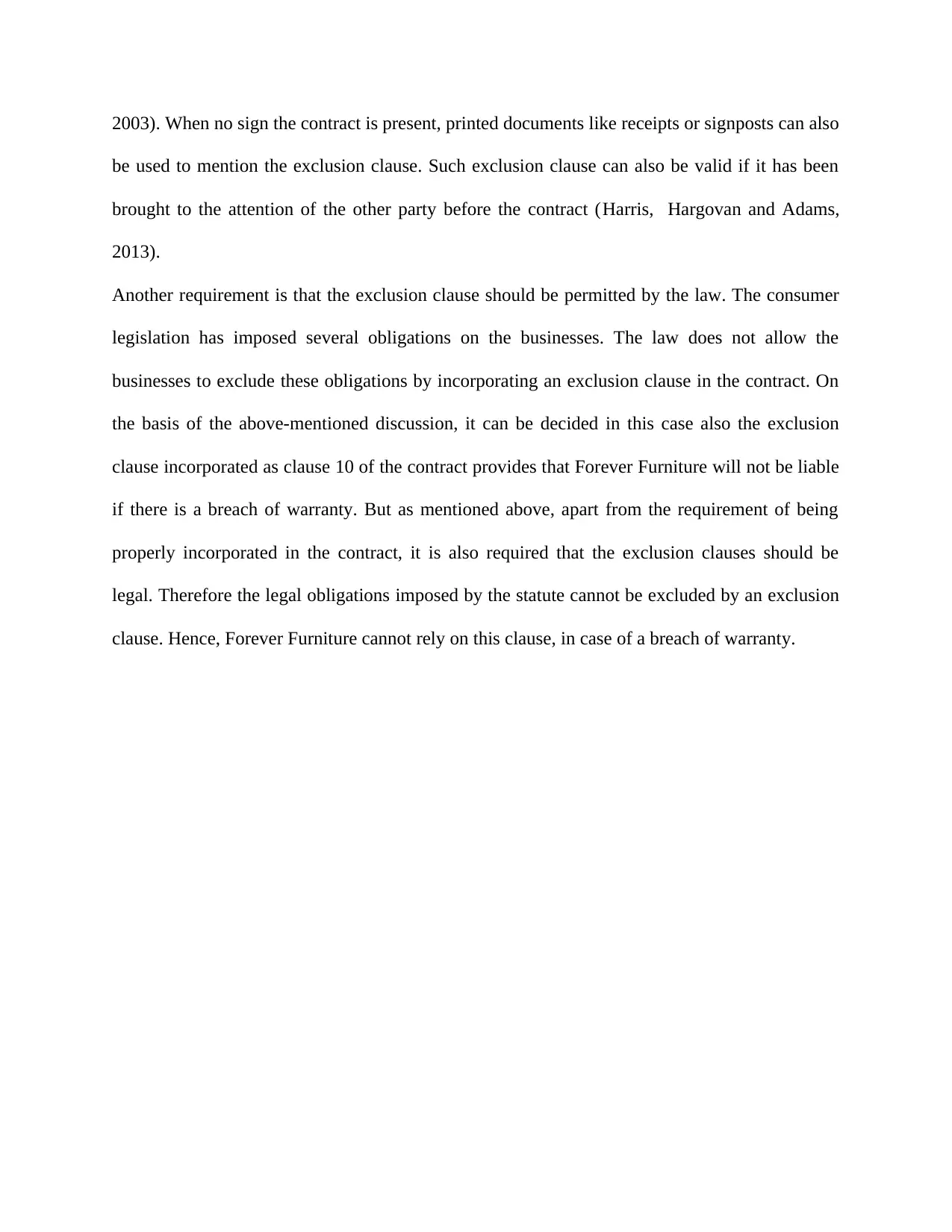
2003). When no sign the contract is present, printed documents like receipts or signposts can also
be used to mention the exclusion clause. Such exclusion clause can also be valid if it has been
brought to the attention of the other party before the contract (Harris, Hargovan and Adams,
2013).
Another requirement is that the exclusion clause should be permitted by the law. The consumer
legislation has imposed several obligations on the businesses. The law does not allow the
businesses to exclude these obligations by incorporating an exclusion clause in the contract. On
the basis of the above-mentioned discussion, it can be decided in this case also the exclusion
clause incorporated as clause 10 of the contract provides that Forever Furniture will not be liable
if there is a breach of warranty. But as mentioned above, apart from the requirement of being
properly incorporated in the contract, it is also required that the exclusion clauses should be
legal. Therefore the legal obligations imposed by the statute cannot be excluded by an exclusion
clause. Hence, Forever Furniture cannot rely on this clause, in case of a breach of warranty.
be used to mention the exclusion clause. Such exclusion clause can also be valid if it has been
brought to the attention of the other party before the contract (Harris, Hargovan and Adams,
2013).
Another requirement is that the exclusion clause should be permitted by the law. The consumer
legislation has imposed several obligations on the businesses. The law does not allow the
businesses to exclude these obligations by incorporating an exclusion clause in the contract. On
the basis of the above-mentioned discussion, it can be decided in this case also the exclusion
clause incorporated as clause 10 of the contract provides that Forever Furniture will not be liable
if there is a breach of warranty. But as mentioned above, apart from the requirement of being
properly incorporated in the contract, it is also required that the exclusion clauses should be
legal. Therefore the legal obligations imposed by the statute cannot be excluded by an exclusion
clause. Hence, Forever Furniture cannot rely on this clause, in case of a breach of warranty.
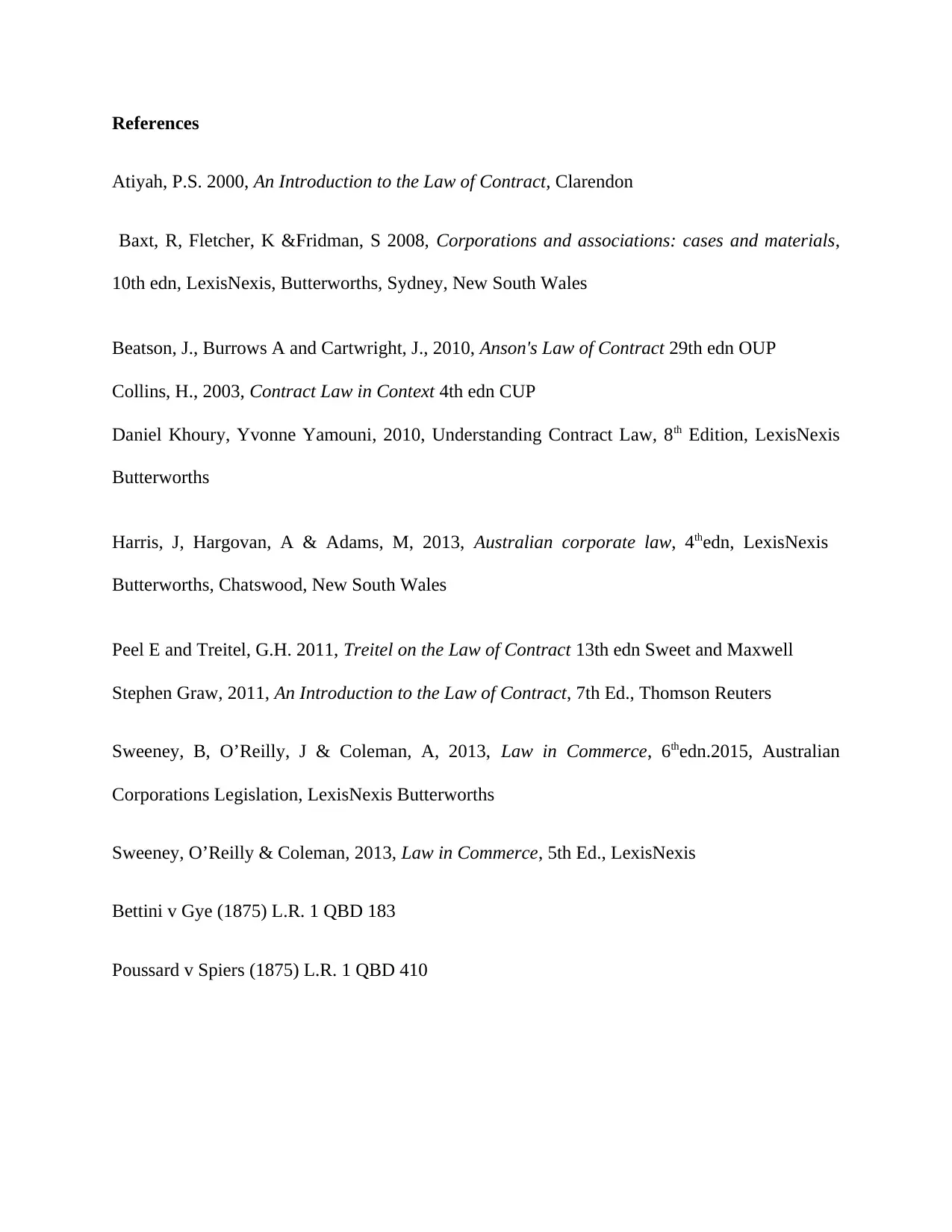
References
Atiyah, P.S. 2000, An Introduction to the Law of Contract, Clarendon
Baxt, R, Fletcher, K &Fridman, S 2008, Corporations and associations: cases and materials,
10th edn, LexisNexis, Butterworths, Sydney, New South Wales
Beatson, J., Burrows A and Cartwright, J., 2010, Anson's Law of Contract 29th edn OUP
Collins, H., 2003, Contract Law in Context 4th edn CUP
Daniel Khoury, Yvonne Yamouni, 2010, Understanding Contract Law, 8th Edition, LexisNexis
Butterworths
Harris, J, Hargovan, A & Adams, M, 2013, Australian corporate law, 4thedn, LexisNexis
Butterworths, Chatswood, New South Wales
Peel E and Treitel, G.H. 2011, Treitel on the Law of Contract 13th edn Sweet and Maxwell
Stephen Graw, 2011, An Introduction to the Law of Contract, 7th Ed., Thomson Reuters
Sweeney, B, O’Reilly, J & Coleman, A, 2013, Law in Commerce, 6thedn.2015, Australian
Corporations Legislation, LexisNexis Butterworths
Sweeney, O’Reilly & Coleman, 2013, Law in Commerce, 5th Ed., LexisNexis
Bettini v Gye (1875) L.R. 1 QBD 183
Poussard v Spiers (1875) L.R. 1 QBD 410
Atiyah, P.S. 2000, An Introduction to the Law of Contract, Clarendon
Baxt, R, Fletcher, K &Fridman, S 2008, Corporations and associations: cases and materials,
10th edn, LexisNexis, Butterworths, Sydney, New South Wales
Beatson, J., Burrows A and Cartwright, J., 2010, Anson's Law of Contract 29th edn OUP
Collins, H., 2003, Contract Law in Context 4th edn CUP
Daniel Khoury, Yvonne Yamouni, 2010, Understanding Contract Law, 8th Edition, LexisNexis
Butterworths
Harris, J, Hargovan, A & Adams, M, 2013, Australian corporate law, 4thedn, LexisNexis
Butterworths, Chatswood, New South Wales
Peel E and Treitel, G.H. 2011, Treitel on the Law of Contract 13th edn Sweet and Maxwell
Stephen Graw, 2011, An Introduction to the Law of Contract, 7th Ed., Thomson Reuters
Sweeney, B, O’Reilly, J & Coleman, A, 2013, Law in Commerce, 6thedn.2015, Australian
Corporations Legislation, LexisNexis Butterworths
Sweeney, O’Reilly & Coleman, 2013, Law in Commerce, 5th Ed., LexisNexis
Bettini v Gye (1875) L.R. 1 QBD 183
Poussard v Spiers (1875) L.R. 1 QBD 410
⊘ This is a preview!⊘
Do you want full access?
Subscribe today to unlock all pages.

Trusted by 1+ million students worldwide
1 out of 6
Related Documents
Your All-in-One AI-Powered Toolkit for Academic Success.
+13062052269
info@desklib.com
Available 24*7 on WhatsApp / Email
![[object Object]](/_next/static/media/star-bottom.7253800d.svg)
Unlock your academic potential
Copyright © 2020–2026 A2Z Services. All Rights Reserved. Developed and managed by ZUCOL.





